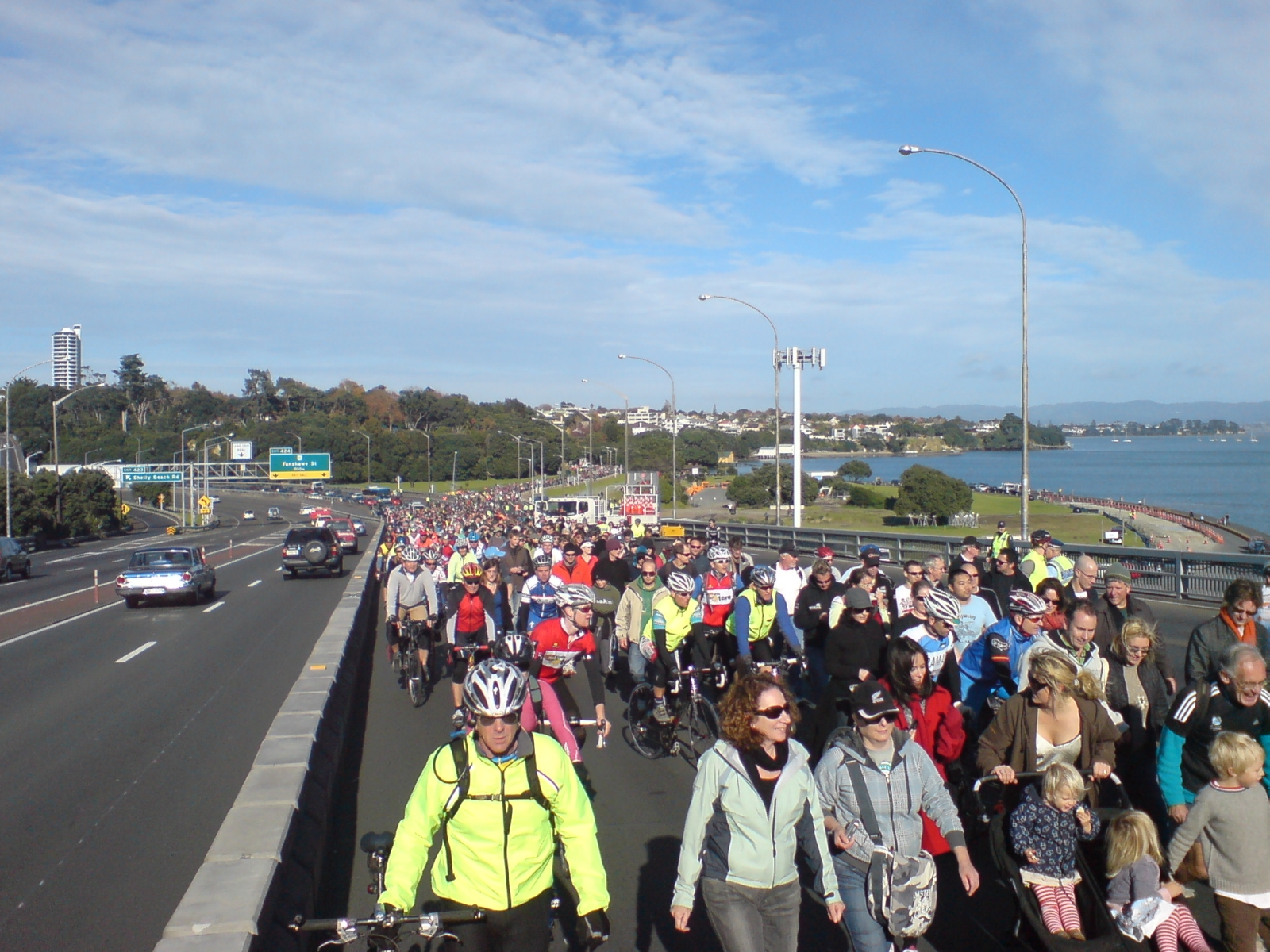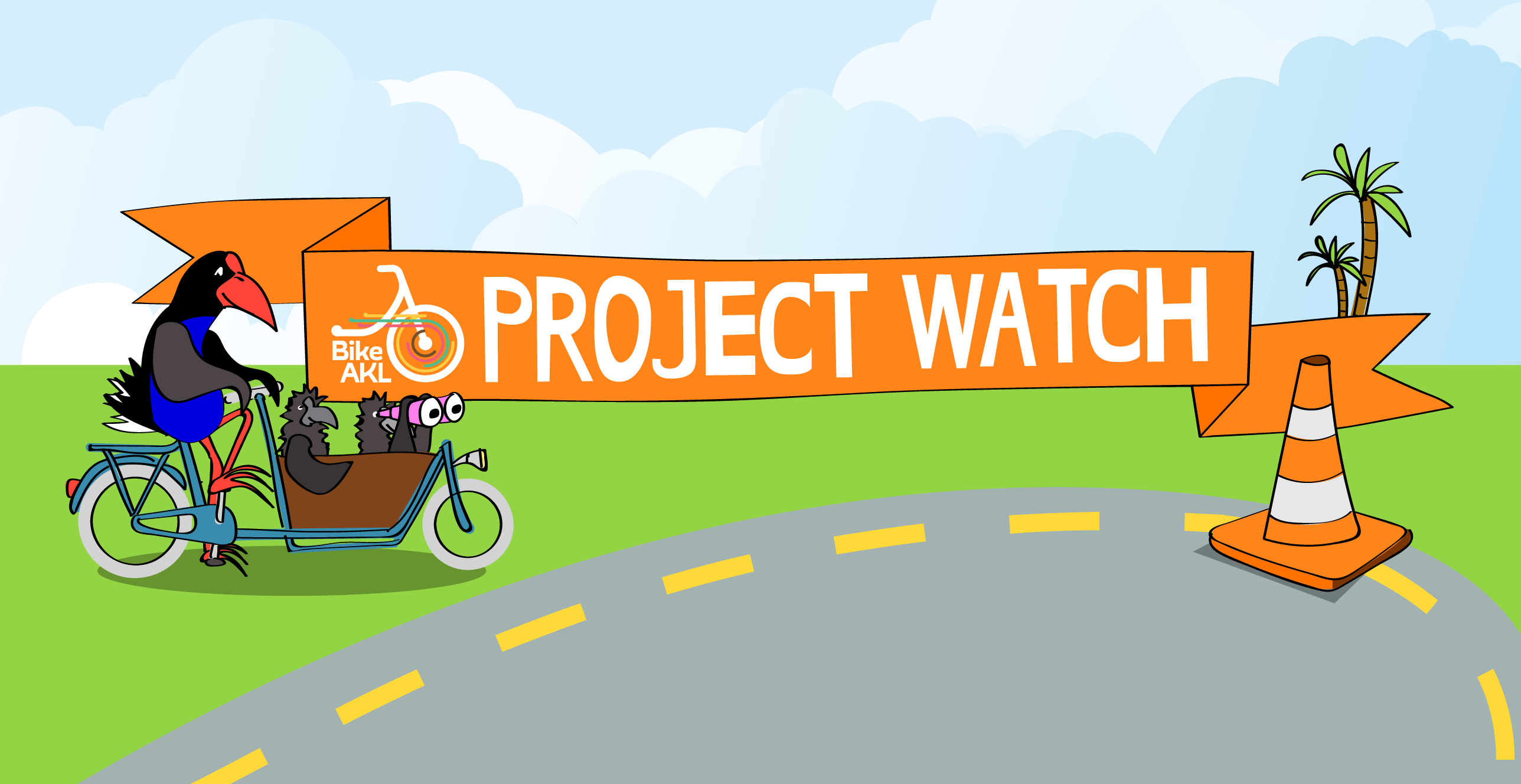Cycling in Auckland has increased by 27% last year and growth is expected to continue. In parts of the region, like the former Auckland City, cycling increased by 40%. Aucklanders are realising that cycling offers choice and convenience.
Cycle Action Auckland requests that Auckland Council appoint a ‘Cycling Champion’ who will strengthen the role of cycling for transport and recreation to help speed the transformation of Auckland into one of the World’s most liveable cities. An Auckland Council Cycling Champion with an overarching role that ensures/facilitates collaboration with Auckland Transport and NZTA will ensure that cycle growth is prioritised and cycling funding is increased to a level that will ensure that the Mayor’s vision for change happens.
Cycling, when embraced as a serious transport mode, is integral to creating ‘an excellent transport system’. This is clearly indicated by the significant investment being made by our two closest international cities, Melbourne and Sydney –which compete with Auckland for tourists, residents and business.
Cycling can become a serious transport mode in our city – as it is in Melbourne and Sydney- in this Council’s term. With the appointment of an Auckland Council Cycling Champion, and Cycle Action as a partner, Auckland Council can exploit one of the cheapest solutions to reducing car use and speeding up business traffic movements while transforming Auckland into ‘one of the world’s most liveable cities’.
Comments on the draft plan:
Due to the lack of detail in the plan it is difficult to accurately assess, even with the capital projects listed in Appendix 1, what actual value of cycling investment is proposed. It would be very useful to understand what aspects of the major roading projects will cause growth in cycle transport.
We are encouraged that there appears to be around $5million of cycling related projects, however, we consider a greater level of investment is needed to boost cycling growth. To double the number of Auckland commuter cyclists from 1% (2006 Census) to 2%, a dedicated funding stream of 2% of of the Transport CAPEX is considered the appropriate weighting, which would come to $7.3 million in the Annual Plan.
Further reasons for a higher investment in cycling over the next year:
- Cycling is an inexpensive investment in changing the city, especially compared with other transport projects.
- Better cycling access is a key factor in increasing the reach and patronage of public transport (and is cheap compared to park & ride facilities).
- Off-road cycling routes, designed to appeal to commuters, provide direct congestion relief for major arterials, as well as encouraging novice riders.
- The Regional Land Transport Strategy 2010 commits the region to completing 50% of the Regional cycle Network by 2016. (Only 21% of the network was completed by 2010.)
Cycling infrastructure and education should be regarded as high priority:
- The Regional Cycling Network – should be listed as a key transport project – as contained in the Regional Land Transport Strategy. Work should prioritise filling network gaps to add continuity to cycle routes, such as on Tamaki Drive and the Northwestern Cycleway
- ‘Blackspots’ on main cycling routes, like Tamaki Drive, should be fixed urgently.
- Council must continue to engage with NZTA on the Central Motorway Junction Cycleway to provide for local cycling connections on Council land. Auckland Council’s contribution is needed to complete the continuity of these strategic cycle routes e.g. to central destinations such as the Universities and CBD/Waterfront/Tamaki drive.
- New Lynn Transport Centre / Transport Oriented Development must provide safer cycle access to the transport hub (currently behind a “sea of roads” and provide more off-road cycle paths in the TOD area.
- AMETI – ‘new build’ and ‘full’ road upgrade projects in AMETI can exploit the opportunity to provide off-road paths and “Copenhagen cycle lanes”
- Harbour Bridge walkway / cycleway The Council can follow up on the Mayor’s aspiration, in the short term, by improvements to waterfront cycling links, which will later connect to a Harbour Bridge cycleway
- Hobson Bay to Resolution Point – provision of a cycle way crossing along the railway to link with the Orakei – Meadowbank boardwalk.
- Wynyard Quarter projects should make cycling accessibility a key aspect.
- Public bike hire availability – this service should be restored before the RWC, to offer transport choice in CBD, reduce car dependency for door to door trips and city apartment dwellers as well as add to ‘the visitor experience’.
- Travel behaviour change projects – for all aucklanders – particularly in schools, workplaces and popular destinations. This will include such initiatives as encouraging office travel plans, bicycle storage and shower facilities in workplaces and conveniently situated ‘bike stations’.
An overarching emphasis on cycling as a serious transport mode would enhance outcomes in other areas of Council expenditure.
Lifestyle and culture – Parks and open spaces ‘residents and visitors lead healthy and active lifestyles’ – enable cycling for recreation and as part of commuter routes. The upgrading of walkways across the region should also include provision for cycle travel.
Economic Development – Cycling has benefits for tourism, as well as reducing commuter car use and thus speeding up freight and business traffic.
Street environment – Town Centres – provision of safe cycling access and parking for bikes in all town centres will enhance visitor experience. The planned Pukekohe Town Centre upgrade is an opportunity to model first class cycling facilities –‘a bikeability centre’ – at a large transport hub.
Planning and policy –a rise in cycling numbers will contribute to ensuring that growth and activity in Auckland is managed to retain and improve a high-quality and sustainable environment and quality of life for Aucklanders.
Environmental strategy and programmes – transport choices resulting in decreased car use will improve air quality. Cycling is an integral component of a more sustainable lifestyle for Aucklanders.
Cycle Action Auckland would like to speak to this submission.
Barbara Insull, Secretary CAA



